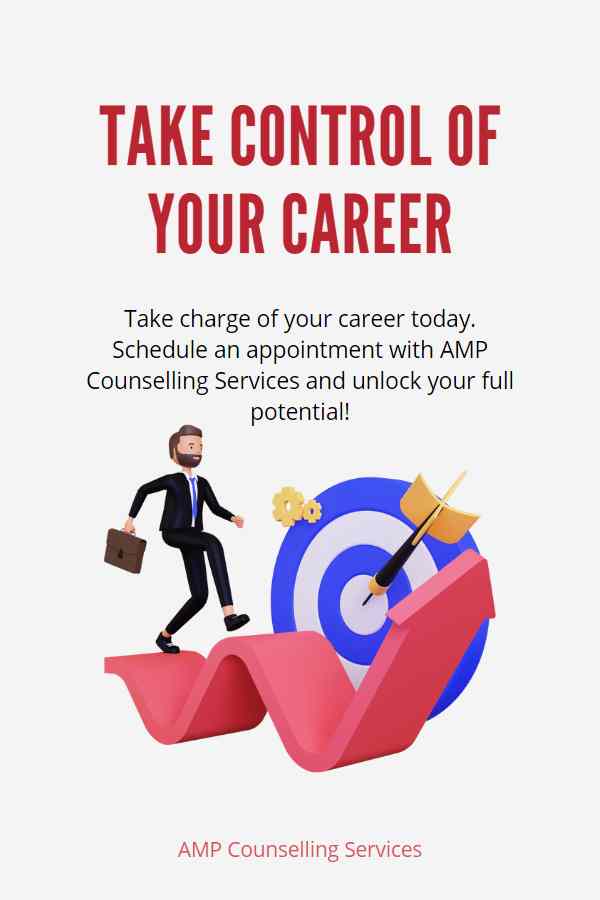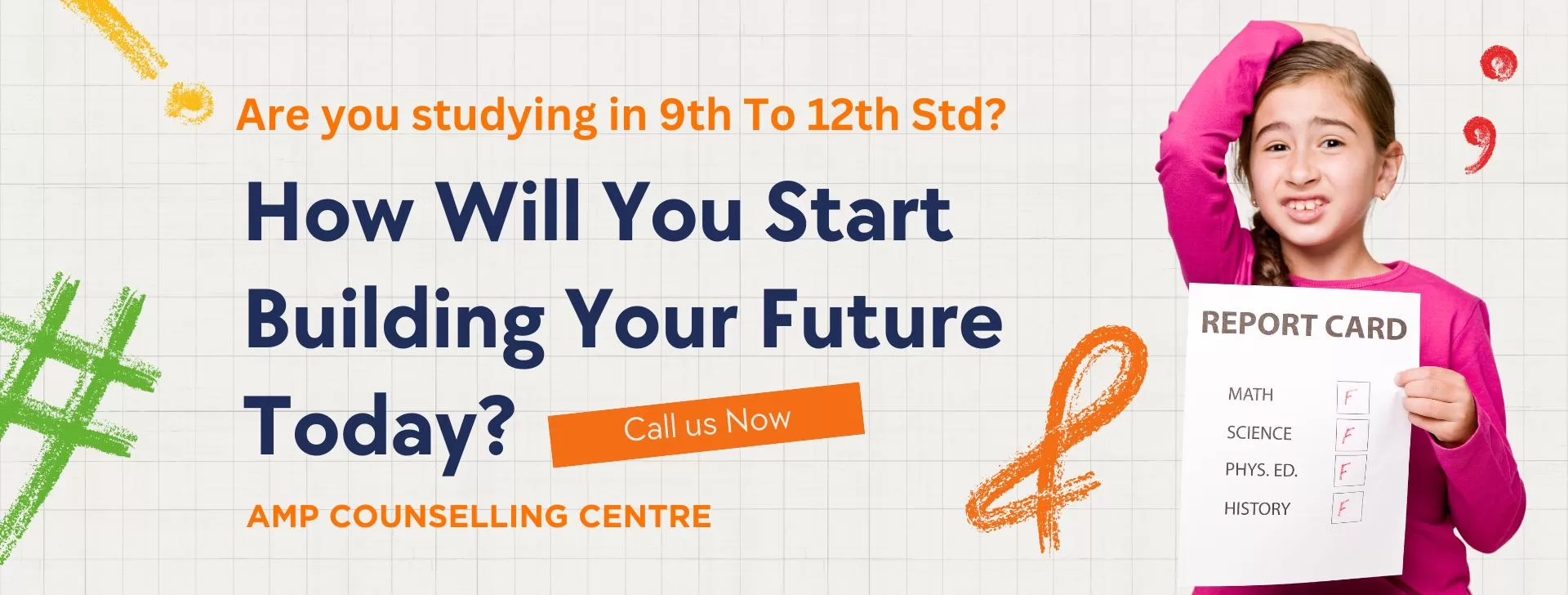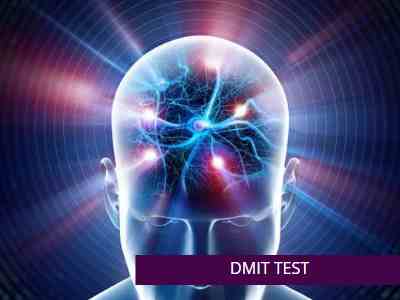Welcome To
Career Counselling Navi Mumbai
Welcome to AMP Counselling Services, your go-to destination for comprehensive career counselling and career guidance in Navi Mumbai. We understand that choosing the right career path can be a daunting task, which is why we offer expert career counselling services to help you navigate the complex world of work.
Whether you're a student just starting out on your career journey or a seasoned professional looking to make a career change, our team of experienced career counsellors is here to guide you every step of the way. We provide personalized career guidance to help you identify your strengths, explore different career options, and develop a plan to achieve your career goals.
Our career counselling services are designed to cater to a wide range of needs, including free career counselling for students. We believe that everyone deserves the opportunity to pursue their dream career, regardless of their background or financial status. So if you're looking for reliable career counselling services in Navi Mumbai, look no further than AMP Counselling Services. Contact us today to schedule an appointment and take the first step towards a fulfilling and successful career.
The AMP COUNSELLING CENTRE has its base in core research which enables it to come up with scientifically proven services and effective outcomes.
Our Services are highly customized to meet the specific needs of individuals, and they never follow a template approach..
A team of senior dedicated counsellor's are exclusively assigned for working on DMIT, which enhances the efficiency of the service.
DMIT’s base is in neuroscience and genetics, to estimate the brain power and the in-built abilities, DMIT Test is the most effective way.
Take charge of your career today. Schedule an appointment with AMP Counselling Services and unlock your full potential!
Why Career Counselling is Important?
Unlock Your Potential with Expert Career Counselling and Guidance

Choosing The Right Career Path Is A Crucial Decision That Can Significantly Impact Your Overall Job Satisfaction, Financial Security, And Sense Of Fulfillment. That's Why At AMP Counselling Services, Located In Navi Mumbai, We Believe That Career Counselling And Guidance Is Essential. Our Experienced Team Of Career Counsellors Is Dedicated To Helping You Identify Your Strengths, Explore Various Career Options, And Develop A Plan To Achieve Your Career Goals.
We Offer A Range Of Services That Include Career Counselling, Career Guidance, And Free Career Counselling For Students. Our Student Counselling Services Are Designed To Assist Young People In Making Informed Decisions About Their Future And Set Them On The Path To Success. We Believe That All Students, Regardless Of Their Financial Situation, Should Have Access To High-Quality Career Guidance.
Our Career Counselling Services Are Also Beneficial For Professionals Who Are Considering A Career Change Or Looking To Advance In Their Current Field. Our Counsellors Can Help You Identify Your Transferable Skills, Explore Different Career Options, And Develop A Plan To Achieve Your Career Goals. So If You're In Navi Mumbai And Seeking Reliable Career Counselling And Guidance, Look No Further Than AMP Counselling Services. Contact Us Today To Schedule An Appointment And Take The First Step Towards A Fulfilling And Successful Career.
Our Career Counselling Services

Parenting Coach Navi Mumbai
At Positive Parenting Explorer, we believe that parental support and guidance play a crucial role in shaping a child's future. That's why we offer career counselling services for students to help them explore different career options and make informed decisions about their future.
Don't let indecision hold you back. Schedule a career counselling session now and take control of your future!
See All Career Counselling Services
FAQ
What is Career Counselling and why is it important?
Career Counselling is a process that helps individuals make informed decisions about their career paths. It is important because it provides guidance and support in identifying suitable career options based on one's interests, skills, and goals.
Who can benefit from Career Counselling services at AMP Counselling Center in Vashi, Navi Mumbai?
Career Counselling services at AMP Counselling Center are beneficial for students, job seekers, professionals looking for a career change, and individuals seeking guidance in their career development.
Why should I choose AMP Counselling Center for Career Counselling?
AMP Counselling Center has experienced career counsellors who provide personalized guidance, comprehensive assessments, and practical insights to help individuals make well-informed career decisions. The center is known for its professionalism, expertise, and commitment to client success.
Where can I find reliable Career Counselling services in Vashi, Navi Mumbai?
AMP Counselling Center, located in Vashi, Navi Mumbai, offers reliable and professional Career Counselling services. The center has a team of qualified counsellors who specialize in career guidance and provide tailored support to individuals.
What are the benefits of Career Counselling?
Career Counselling offers several benefits, including gaining clarity about career goals, identifying strengths and weaknesses, exploring suitable career options, making informed decisions, enhancing self-awareness, and maximizing career satisfaction and success.
How does Career Counselling work at AMP Counselling Center?
Career Counselling at AMP Counselling Center involves a structured process that includes assessments, one-on-one sessions with a career counsellor, exploration of interests and skills, goal setting, and guidance in creating a career action plan. The counsellor provides support and resources to help individuals achieve their career aspirations.
What is the cost of Career Counselling at AMP Counselling Center?
The cost of Career Counselling at AMP Counselling Center may vary depending on the specific services required. It is best to contact the center directly to inquire about the pricing details.
For whom is Career Counselling suitable?
Career Counselling is suitable for individuals at various stages of their career journey, including students planning their educational path, graduates seeking job opportunities, professionals considering a career change, and individuals seeking guidance in career development and growth.
How can Career Counselling help in finding the best career fit?
Career Counselling utilizes assessments, exploration of interests and skills, and personalized guidance to help individuals find the best career fit. It assists in identifying career options that align with their strengths, interests, and values, leading to greater job satisfaction and fulfillment.
What makes AMP Counselling Center the best choice for Career Counselling in Vashi, Navi Mumbai?
AMP Counselling Center stands out as the best choice for Career Counselling due to its experienced team of career counsellors, client-centered approach,comprehensive assessments, personalized guidance, and reputation for delivering successful outcomes. The center's location in Vashi, Navi Mumbai provides convenient access to individuals seeking professional Career Counselling services.
































